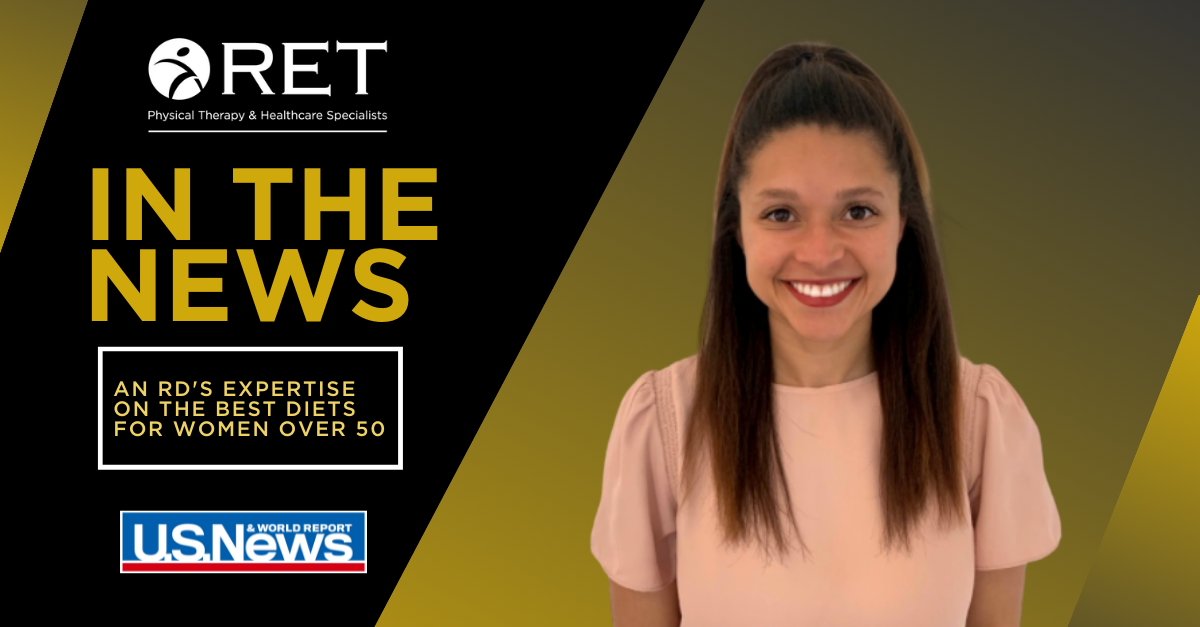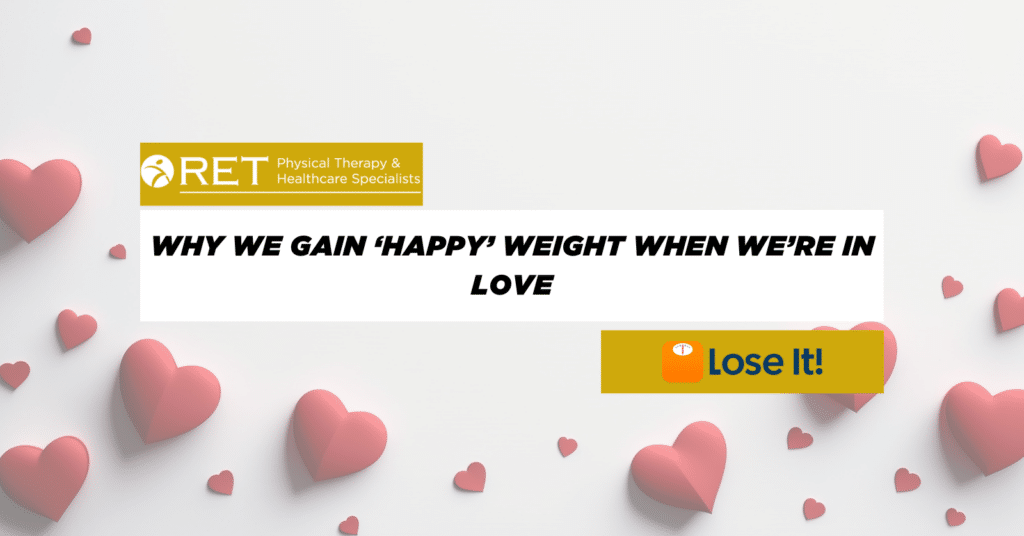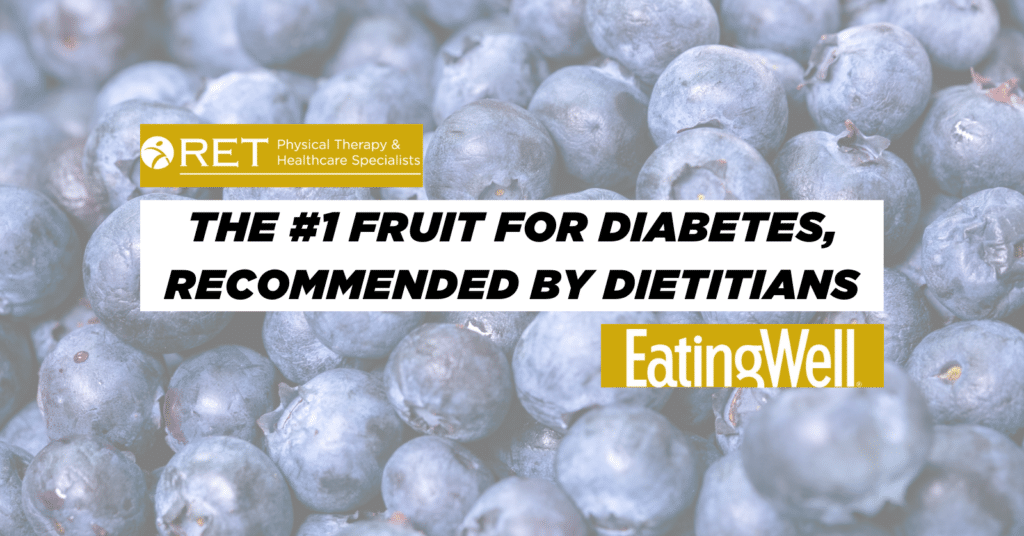Our very own Betsy Fears, RDN, was recently interviewed by U.S. News & World Report on the best diets for women over 50, read on below.
Best Diets for Women Over 50
Betsy Fears, a registered dietitian nutritionist who practices at RET Physical Therapy Group in Lake Stevens, Washington, about 40 miles north of Seattle, says many of her women clients become alarmed and puzzled when they put on unexpected pounds around age 50.
Some of her women clients gain between 10 and 30 pounds when they hit menopause – which is defined as “the cessation of ovulatory function of the ovaries, and is marked by the end of regular menstruation,” according to Dr. Janis Fee, an OB-GYN with Providence St. Joseph Hospital in Orange County, California. The transition to menopause typically begins between ages 45 and 55, according to the National Institute on Aging.
Some clients say, “I don’t get it, what’s changed?” Fears says.
Weight Gain in Women Over 50
Menopause is one factor. “During menopause, women’s body composition takes a turn, increasing muscle breakdown and increasing fat accumulation, particularly in the belly area,” says Maxine Smith, a registered dietitian with Cleveland Clinic’s Center for Human Nutrition.
Some weight gain can be attributed to a slower metabolism. However, changes in metabolism aren’t significant for people in their 40s and 50s, research suggests. Some women put on weight, Fears says, because they aren’t as physically active as they were earlier in their lives, before the demands of their career, raising children and in some cases caring for elderly parents.
Also, as women age, their bodies experience hormone fluctuations, which can lead to weight gain, says Amy Kimberlain, a national spokesperson for the Academy of Nutrition and Dietetics. She’s a registered dietitian certified in diabetes care.
Serious chronic medical conditions are another potential contributor. As women become older, some develop medical conditions that can lead to fluctuations in weight.
These conditions may include:
Changing Nutritional Needs
If you’re a woman age 50 or above, it’s important to consider which eating regimen works for you as your nutritional needs change, says Lisa Jones, a registered dietitian based in Philadelphia.
In particular, women age 50 and above need to make sure they get enough of these nutrients:
These nutrients are important for women as they age for a variety of reasons, Fears says.
Vitamin B12 is a common deficiency due to age-related decrease in absorption. The vitamin is important for red blood cell production to help prevent anemia and aids in the function and development of brain and nerve cells.
As women hit menopause, the decline in estrogen and progesterone make it harder for calcium to be absorbed, which increases the risk of osteopenia (the loss of bone density that is associated with weaker bones) or osteoporosis (a condition in which bones become brittle or fragile). Vitamin D helps with the absorption of calcium, which is good for bone health, Fears says.
Protein is important for preserving muscle mass and for healthy cells. Protein helps fight against slow loss of muscle and helps keep up strength for healthy aging. Protein also aids in repair and maintenance of cells, making hormones and wound healing.
Protein needs can be met by consuming a variety of meat, poultry, fish, dairy and plant-based proteins, such as tofu and tempeh.
Best Diet Plans for Women Over 50
Given all these factors, these three diets could be good options for women age 50 and above:
This acronym, which stands for dietary approaches to stop hypertension, is promoted by the National Heart, Lung and Blood Institute to prevent or stop hypertension, or high blood pressure. The DASH diet is a heart-healthy eating style, Smith says.
The DASH diet emphasizes:
- Fat-free or low-fat dairy products.
- Fruits.
- Lean proteins (eggs, skinless chicken, lean meat, seafood).
- Whole grains.
- Vegetables.
- Limiting sugar-sweetened beverages and foods with added sugars.
This eating regimen is low in saturated fat and sodium.
The DASH diet is high in these nutrients:
- Calcium.
- Fiber.
- Magnesium.
- Potassium.
This eating approach, which is naturally adopted by people who live in regions surrounding the Mediterranean Sea, is highly rated by many registered dietitians and is rated the top diet overall by U.S. News’ team of experts.
The Mediterranean diet emphasizes whole foods, including:
- Low-fat or no-fat dairy products.
- Fish.
- Lean protein (eggs, poultry, seafood, occasional servings of red meat).
- Olive oil.
- Nuts.
- Seeds.
The MIND diet is a plant-rich eating regimen that includes foods that research suggests help boost brain function, including:
Research suggests the MIND diet helps reduce the risks of dementia. For example, research published in January in the journal Alzheimer’s Research & Therapy followed more than 8,000 participants over a number of years. “Better adherence to the MIND diet is associated with a decreased risk of dementia within the first years of follow-up,” researchers wrote, adding that further research is needed to determine “to which extent the MIND diet may affect the risk of dementia.”
“Even those who follow the diet may only moderately experience a slower rate of mental decline,” Jones says.
Choosing the Best Diet for Women Over 50
Choosing which eating regimen works for you is a personal issue, Fears says.
“The best type of diet to choose is one that is sustainable for the long term and fits your food preferences,” she says. “It also shouldn’t feel like a ‘diet.’ Typically, diets are viewed as short-term changes to eating patterns to achieve a goal and they can (feel) very restrictive. In order to reap the health benefits of these diets view them as a change in long-term eating patterns and pick one you will find enjoyable.”
Read full article here: https://health.usnews.com/wellness/food/articles/best-diets-for-women-over-50




